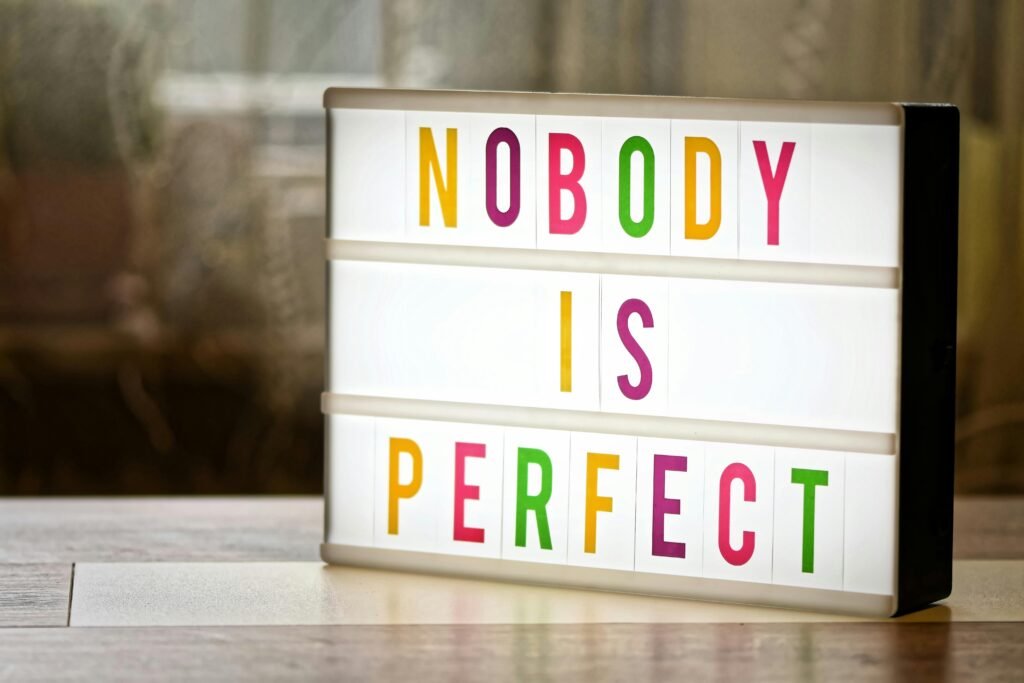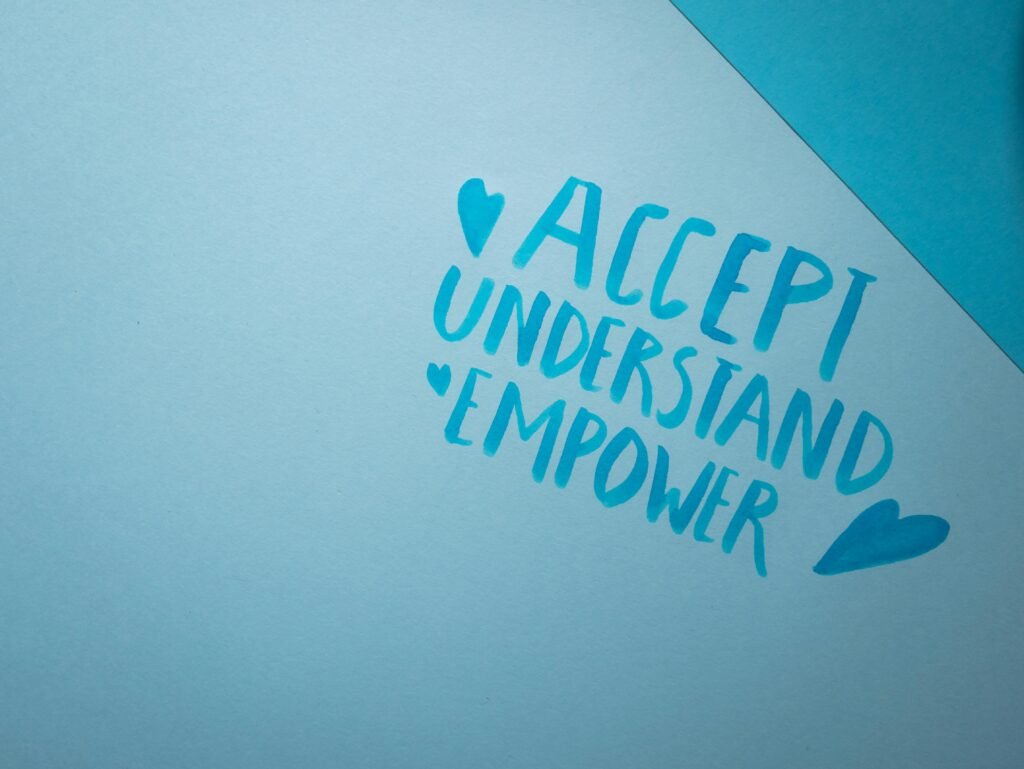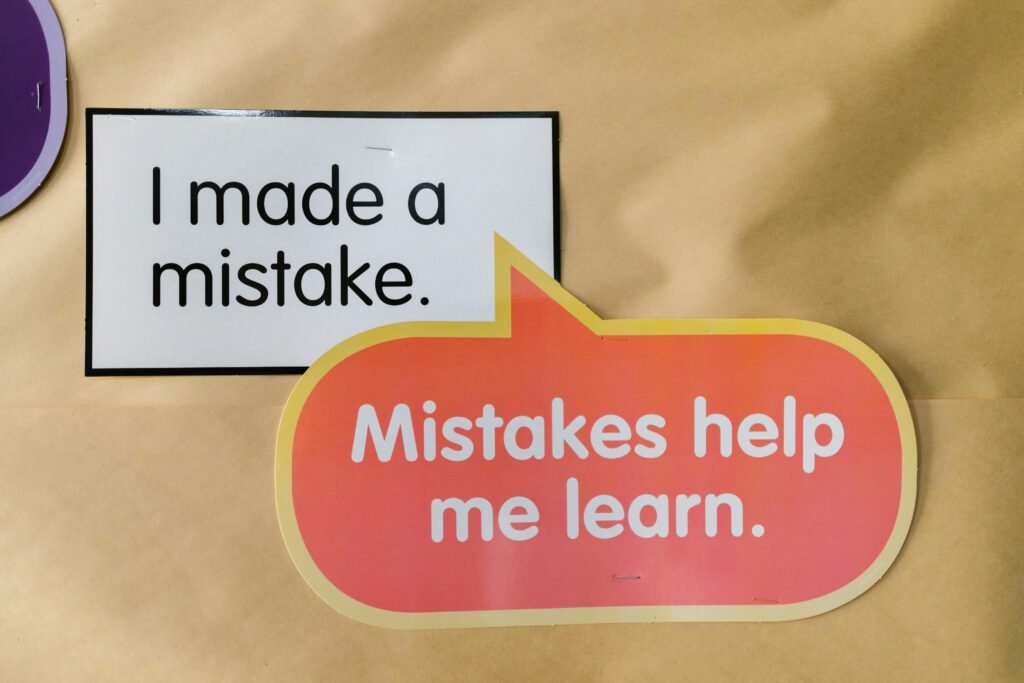
Introduction to Imperfection
When we think about self-improvement, the idea of striving to be “perfect” can be tempting.
After all, the promise of perfection feels like it will lead to a life free from mistakes, criticism, or regrets.
But the truth is, this mindset often sets us up for disappointment and leaves little room for genuine growth.
Perfection is an illusion, and chasing it can create an endless cycle of frustration.
Imperfection, on the other hand, is what makes us human.
It’s also where meaningful personal development begins.
Embracing imperfection isn’t about ignoring your potential or excusing harmful behaviors.
Instead, it’s about shifting your focus away from unrealistic ideals and recognizing that flaws and mistakes are natural parts of life.
For instance, consider how children learn to walk.
They fall countless times before taking their first steps, but every tumble teaches them something new.
We don’t see their falls as failures; we see them as essential parts of the process.
Adults are no different; stumbling along the way is how we gain insight and build resilience.
By acknowledging our imperfections, we create space for compassion; not just for ourselves, but for others, too.
When you stop expecting yourself to “have it all together,” it becomes easier to appreciate the messy, beautiful reality of being human.
This mindset allows for a deeper connection with others, as we’re no longer hiding behind a mask of perfection.
Instead, we can show up authentically, flaws and all.
Consider this: If you spend all your energy trying to avoid mistakes, you might miss out on valuable experiences and lessons.
Imagine someone so afraid of failing a new recipe that they never try cooking anything unfamiliar.
They might avoid a burnt dish, but they also miss the joy of discovering a meal they love or the sense of accomplishment that comes with improvement over time.
Life isn’t about getting it right on the first try; it’s about growing, adjusting, and learning along the way.
In self-improvement, imperfection is not the enemy.
It’s a teacher.
It challenges us to face discomfort, adapt, and develop in ways that perfection never could.
And when you allow imperfection to play a role in your journey, you open yourself up to the kind of growth that truly lasts.
The Downside of Perfectionism

While striving for improvement is a natural part of personal growth, perfectionism can often become a stumbling block rather than a motivator.
It’s easy to see why the idea of perfection can be alluring; it promises a sense of control, success, and approval.
However, perfectionism can be deeply problematic when it’s rooted in excessive self-criticism and an inability to accept anything less than flawless results.
Perfectionism often tricks us into believing that mistakes are unacceptable and that falling short is evidence of personal failure.
This mindset not only creates a constant sense of dissatisfaction but also makes it harder to take risks or try new things.
Fear of failure becomes the driving force, and the idea of growth takes a backseat.
Whether it’s hesitating to voice your ideas at work or putting off pursuing a passion project, perfectionism can prevent you from fully engaging with opportunities that might lead to meaningful progress.
Additionally, this constant pursuit of perfection can result in burnout.
Spending endless hours obsessing over minor details or revising tasks over and over drains energy and leaves little room for creativity or flexibility.
For instance, someone who delays submitting a report because it isn’t “perfect enough” may end up missing deadlines and feeling even more stressed as a result.
Over time, this cycle can erode not only productivity but also self-confidence, as perfectionists often internalize the idea that their efforts are never good enough, no matter how much time or energy they invest.
What’s particularly harmful is how perfectionism can limit our ability to appreciate progress.
Embracing Flaws as Growth Opportunities

Acknowledging and accepting our imperfections is not about settling for less; it’s about giving ourselves the space to grow in a healthier, more sustainable way.
When we stop viewing flaws as roadblocks and instead see them as opportunities, we can begin to develop a kinder relationship with ourselves.
Research shows that self-compassion plays a key role in counteracting the negative effects of self-critical perfectionism.
Flaws often hold valuable lessons, but only if we’re willing to engage with them.
Consider the story of someone overcoming a fear of public speaking, not by waiting to feel flawless but by showing up despite their perceived shortcomings.
Each experience; whether smooth or uncomfortable, becomes a chance to build resilience and gain confidence.
By leaning into their imperfections, they not only tackled their fear but also discovered their ability to connect more deeply with others.
On a more everyday level, think about how we learn new skills.
Struggling with something unfamiliar can feel frustrating, but it’s also a sign of progress.
For example, learning a new language often involves mispronunciations and awkward phrasing at first.
Yet, these moments of imperfection are what lead to mastery over time. Without those initial stumbles, growth would be impossible.
Flaws can also teach us to let go of rigid expectations and adapt when things don’t go as planned.
A common example is receiving constructive feedback at work.
While the initial reaction may be to focus on the mistake, a shift in mindset allows us to use that feedback to improve, making us stronger in the long run.
Over time, this approach fosters a sense of humility and openness, helping us grow not just as individuals but in how we relate to others.
Accepting our flaws is not about ignoring our potential; it’s about recognizing that growth is often messy and nonlinear.
And in that process, we often uncover strengths and perspectives that we didn’t even know we had.
Authentic Self-Improvement Practices

True self-improvement begins with setting goals that are achievable and rooted in your unique circumstances, rather than trying to live up to arbitrary external standards.
While it’s natural to want to push yourself, it’s equally important to recognize your limits and honor the progress you make along the way.
Research suggests that maintaining high personal standards; when done in a balanced way, can actually support your well being.
One helpful practice is breaking larger goals into smaller, manageable steps.
This not only makes them feel more attainable but also provides regular opportunities to celebrate your progress.
For instance, if you’re learning a new skill, like photography, focus on mastering one technique at a time rather than overwhelming yourself by trying to excel at everything immediately.
Progress may be slow at first, but each small achievement adds to your sense of accomplishment and builds momentum for future growth.
It’s also essential to embrace setbacks as part of the process.
Rather than seeing them as failures, view them as opportunities to learn and improve.
For example, missing a fitness goal one week doesn’t negate your efforts entirely; it’s simply a chance to reflect on what might need adjustment, whether that’s your approach or expectations.
This mindset not only fosters growth but also helps protect against burnout, as you’re not constantly pressuring yourself to meet unrealistic standards.
Another key element of self-improvement is learning to value effort over immediate results.
By shifting your focus to the work you put in rather than the outcome, you create a healthier relationship with growth.
For instance, someone practicing an instrument may not play flawlessly at first, but by staying consistent and enjoying the learning process, they develop skills that deepen over time.
Finally, take time to assess and redefine what success means to you.
Aligning your goals with your personal values ensures that your self-improvement journey remains meaningful and sustainable, rather than driven by external validation or perfectionism.
Recognizing what genuinely matters to you allows for authentic progress that feels both rewarding and achievable.
The Role of Mindfulness and Acceptance

Mindfulness and acceptance are powerful practices that help us navigate imperfection with greater ease and understanding.
By practicing mindfulness, we train ourselves to stay present, noticing thoughts and emotions without getting caught up in judgment or over analysis.
This can be especially helpful when faced with self-critical or perfectionistic tendencies.
Rather than fixating on mistakes or worrying about outcomes, mindfulness encourages us to observe our experiences with curiosity and compassion.
Over time, this approach can lead to reduced stress and a healthier mindset.
For instance, mindfulness based cognitive therapy has shown promise in helping individuals manage perfectionism and related distress.
Such interventions help increase self-compassion and reduce negative emotions.
This means that mindfulness doesn’t just help us acknowledge imperfections; it fosters a more constructive and compassionate relationship with them.
Through mindful practices, we can begin to reframe setbacks as natural and valuable parts of growth rather than evidence of failure.
Acceptance, on the other hand, is about letting go of the need to control every outcome or meet unattainable standards.
It doesn’t mean giving up on goals or becoming complacent; rather, it’s about acknowledging the reality of imperfection and recognizing that it’s part of what makes us human.
This mindset can be incredibly liberating.
For example, someone learning a new skill might feel frustrated when they struggle initially, but practicing acceptance can shift their focus to the progress they’re making instead of dwelling on their perceived shortcomings.
This approach also helps us form more authentic connections with others.
When we embrace our own imperfections, we become less likely to judge or criticize others for theirs.
This creates space for genuine relationships where vulnerability is not a weakness but a strength.
Consider how much more meaningful conversations can feel when you’re able to admit you don’t have all the answers, rather than trying to appear flawless.
Mindfulness and acceptance work hand in hand to remind us that imperfection isn’t something to fix or hide.
By focusing on what we can control; our reactions, intentions, and efforts, we create a healthier framework for self-improvement.
It’s not about ignoring challenges or pain, but about meeting them with grace and using them as opportunities to grow.
Real-Life Examples of Imperfect Journeys

When we embrace imperfections as part of the growth process, it can lead to transformative outcomes.
Consider the story of a college student struggling with math; a subject they had always found intimidating.
Early on, they frequently made mistakes on assignments and felt tempted to give up.
Instead of focusing on their shortcomings, they decided to treat every error as a learning opportunity.
They sought help from a tutor, practiced consistently, and gradually improved.
What’s notable isn’t that they became a top math student overnight but that they developed resilience and a more confident approach to tackling challenges.
That shift in mindset ultimately benefited them in other areas of life, too.
Another example is a small business owner who faced setbacks in their early years of entrepreneurship.
Their first product launch was underwhelming; sales didn’t meet expectations, and the feedback was far from glowing.
Rather than viewing this as a reason to quit, they used the criticism to better understand their audience’s needs.
Through trial and error, they refined their offerings and, over time, built a business they were proud of.
These early struggles didn’t diminish their success; they became an integral part of their story and a testament to their ability to adapt.
Athletes often have similar journeys.
Think of a runner training for their first marathon.
It’s rare for someone to go from zero miles to completing 26.2 without setbacks.
Perhaps they miss workouts due to injuries or struggle with pacing during practice runs.
What sets successful athletes apart isn’t a flawless training experience; it’s their ability to adjust and continue.
Each misstep, whether it’s a skipped run or a slower than hoped for race, offers valuable lessons on preparation, recovery, and persistence.
Then there are everyday moments that highlight the value of imperfection.
Take, for instance, someone learning to cook for the first time.
They may burn meals, use too much salt, or misread recipes.
These “mistakes” don’t mean they’re bad at cooking; they’re just part of the learning process.
Over time, they gain confidence, refine their skills, and find joy in creating meals for themselves or others.
In all these stories, the common thread is growth through imperfection.
The journey isn’t linear, and success doesn’t come from avoiding mistakes but from approaching them with curiosity and determination.
Each stumble becomes an opportunity to build strength, adaptability, and confidence.
Conclusion

The pursuit of self-improvement is most impactful when it’s grounded in acceptance and a willingness to grow at your own pace.
Perfection isn’t the goal; learning, adapting, and showing up for yourself are what truly matter.
When we let go of the pressure to be flawless, we create the freedom to explore new paths, make mistakes, and discover strengths we didn’t know we had.
Self-improvement doesn’t require you to erase every imperfection; it asks you to meet yourself where you are, with honesty and compassion.
The moments when things don’t go as planned can teach you the most, offering insights that wouldn’t surface in the absence of challenges.
Growth often comes not in leaps but in the small, consistent steps that add up over time.
By valuing these steps, you not only build confidence but also develop a sense of self-worth that isn’t tied to external validation.
It’s also important to remember that your path will look different from anyone else’s.
Social media or comparison to others may paint an unrealistic picture of progress, but your journey is your own, and it’s okay if it’s messy or nonlinear.
True self-improvement is rooted in your individual values and needs, not in meeting someone else’s standards.
Staying aligned with what genuinely matters to you will help you create a sustainable foundation for personal growth.
Just as important as the work you put into yourself is the kindness you show yourself along the way.
Practicing self-compassion means recognizing that setbacks and struggles don’t define your worth.
Instead of criticizing yourself for falling short, focus on what you can learn and how you can move forward.
This shift in mindset fosters resilience, allowing you to handle challenges without losing sight of your progress.
Ultimately, self-improvement is about living more fully and authentically, not about chasing an impossible ideal.
The imperfections you face are not obstacles; they’re opportunities to better understand yourself and the world around you.
By embracing them, you allow space for deeper connections, meaningful experiences, and lasting growth.
Remember, the goal isn’t to be perfect; it’s to become a version of yourself that feels true, fulfilled, and grounded in what’s real.

Awesome post! Really enjoyed reading it.
Thanks so much! Glad it hit home; because imperfection’s got way more character than perfection ever will.
Regards,
Danny Marr
Thanks for sharing. I read many of your blog posts, cool, your blog is very good.